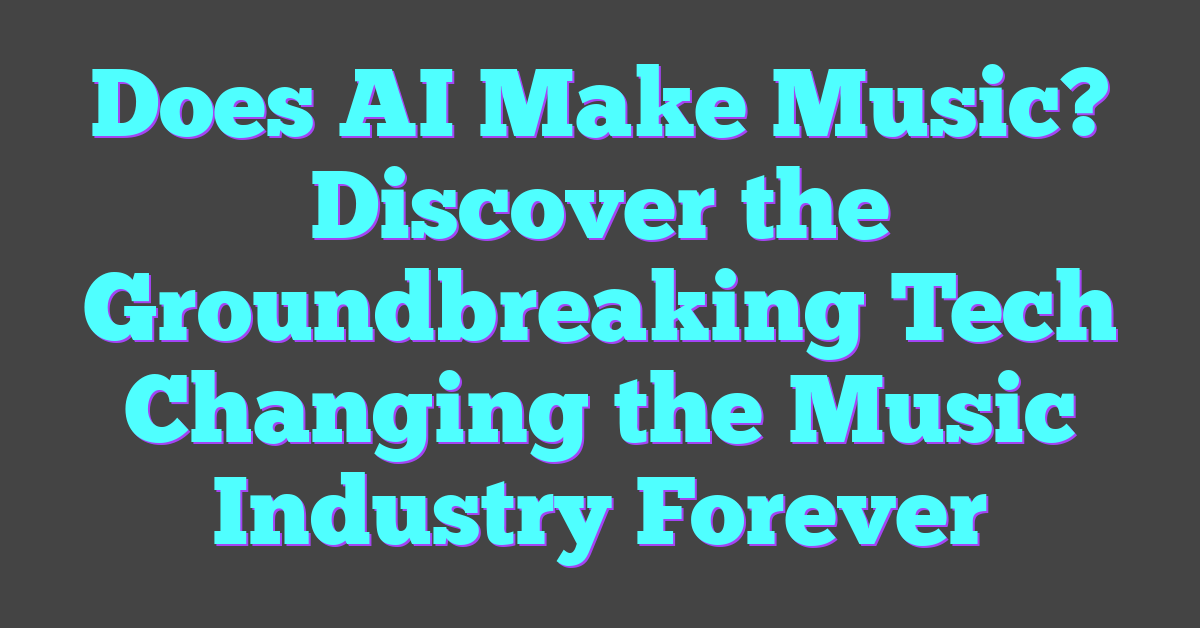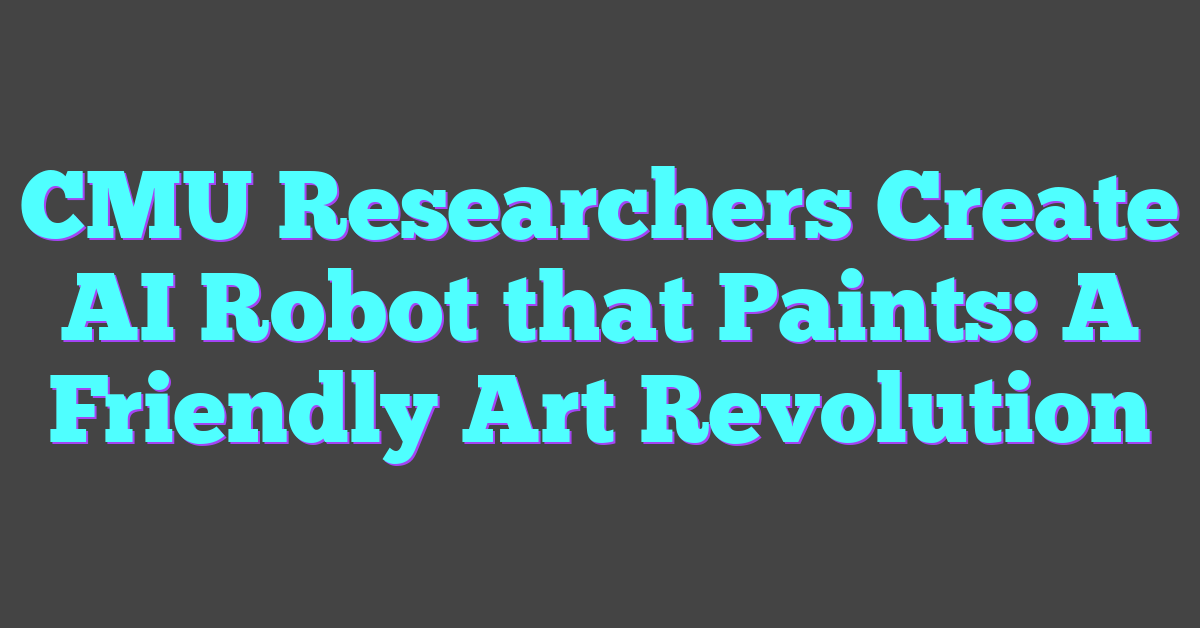Imagine a world where your favorite tunes aren’t just composed by humans but also by intelligent machines. With the rapid advancements in artificial intelligence, this isn’t a far-fetched idea anymore. AI is stepping into the music industry, creating melodies, harmonies, and even full compositions that can rival human creativity.
But does AI truly make music, or is it just mimicking patterns and sounds? This intriguing question sparks curiosity and debate among music enthusiasts and tech aficionados alike. Let’s dive into how AI is transforming the music landscape and whether it can genuinely capture the soul and emotion that human composers bring to their art.
The Emergence of AI in Music Creation
Artificial intelligence has made significant strides in various creative fields, and music creation is no exception. AI’s capability to generate complex musical compositions has opened new doors for both musicians and tech enthusiasts.

What Is AI-Generated Music?
AI-generated music refers to compositions created using algorithms and machine learning models. These algorithms analyze vast datasets of existing music to learn patterns and structures. Platforms like OpenAI’s Jukedeck and Google’s Magenta have developed AI tools capable of generating original music pieces across different genres.
History and Evolution of AI in Music
The integration of AI into music began in the 1950s. Early experiments involved algorithmic compositions, where simple rules generated musical sequences. By the 1980s, digital synthesizers and MIDI technology allowed more sophisticated computer-generated music. The 21st century brought machine learning into the fold, enabling AI to understand and replicate more intricate aspects of music composition.
In 2016, researchers from Sony CSL Research Lab created “Daddy’s Car,” a song composed by AI, inspired by The Beatles. This marked a milestone, showcasing AI’s potential for creating stylistically coherent music. As deep learning and neural networks advanced, AI’s ability to generate nuanced and emotionally resonant music improved remarkably.
How AI Creates Music
AI’s role in music creation has advanced rapidly, leveraging complex algorithms and machine learning models to produce innovative compositions. It generates harmonious and diverse sounds across genres, fascinating music lovers and tech enthusiasts alike.
The Technology Behind AI Music Composition
AI music composition involves using sophisticated algorithms, neural networks, and machine learning models to craft original music. Generative adversarial networks (GANs) and recurrent neural networks (RNNs), such as Long Short-Term Memory (LSTM), are popular methods. GANs consist of two neural networks: one generates content while the other evaluates it. This process refines the resulting music, ensuring it’s appealing and coherent. RNNs handle sequential data, making them ideal for music by learning from previous notes to predict future ones, maintaining a natural flow.
OpenAI’s MuseNet and Google’s Magenta are notable AI systems. MuseNet can create compositions with up to 10 instruments, span various styles, and mimic famous composers. Meanwhile, Magenta focuses on developing new tools and deep learning models for artists and musicians, significantly contributing to AI’s creative capabilities.
Learning Patterns and Generating Sound
AI learns musical patterns by analyzing extensive datasets of songs. It identifies structures, rhythms, and harmonies, which it uses to generate music. Deep learning models dissect these elements, internalizing musical theories and the intricacies of compositions. As AI processes more music, it becomes adept at recognizing genres and styles.
An example is Sony’s Flow Machines, which generated “Daddy’s Car,” a song inspired by The Beatles. This system analyzed countless songs to understand The Beatles’ style, enabling it to produce a piece reflective of their iconic sound. Similarly, AIVA (Artificial Intelligence Virtual Artist) has composed original orchestral pieces used in various media contexts.
By imitating human creativity, AI can produce music that resonates emotionally and stylistically with listeners.
Advantages of Using AI in Music Production
AI enhances music production by boosting efficiency, speed, and creativity, making it a valuable tool for both amateur and professional musicians.
Efficiency and Speed
AI accelerates the music creation process. Traditional methods require extensive time spent on composition, arrangement, and mixing. AI-powered tools streamline these tasks, allowing faster turnaround times. Platforms like Amper Music enable users to generate complete tracks in minutes. By reducing manual effort, AI frees artists to focus on creativity.
Unlimited Creative Potential
AI offers limitless creative possibilities. By analyzing vast datasets, AI can blend genres, mimic various artists, and introduce new sounds. Tools like Jukedeck provide unique compositions tailored to specific moods or themes. AI supports experimentation, enabling musicians to explore unconventional styles without technical constraints.
Challenges and Criticism
Despite the advancements in AI-generated music, significant challenges and criticisms remain.
Authenticity Concerns
Some critics argue that AI lacks the emotional depth of human-generated music. AI-created compositions may follow musical patterns from datasets, but can’t authentically replicate the human experience. While tools like Magenta or MuseNet can imitate artists, the nuances of personal creativity become filtered through data. Emotional authenticity in music often hinges on intentional imperfections, which AI might miss.
Impact on Human Musicians
AI’s rise in music production has sparked fears of reduced opportunities for human artists. Musicians and composers may worry about losing jobs to AI, especially in commercial sectors like advertising and film scoring. The democratization of music creation through platforms like Amper Music or Jukedeck might dilute the market, making it harder for human musicians to stand out. However, AI can also collaborate with artists, offering new ways to enhance human creativity rather than replace it.
The Future of AI and Music
AI is poised to revolutionize music in unprecedented ways, blending computational power with creative expression to reshape the landscape.
Innovations on the Horizon
AI continues to break new ground in music. Future tools will likely evolve beyond mere imitation of existing styles to generate entirely new genres. Developments in deep learning, particularly recurrent neural networks (RNNs) and generative adversarial networks (GANs), are pushing the boundaries of music composition. OpenAI’s MuseNet, capable of generating music in various styles, exemplifies current advancements.
Virtual reality (VR) environments integrating AI can offer immersive musical experiences. These platforms can allow users to interact with AI-driven music generators. For example, music therapy could see significant enhancements through AI’s ability to adapt compositions in real-time based on user feedback.
Ethical Considerations and Regulations
AI’s role in music creation brings ethical questions that need addressing. Authenticity and originality are prime concerns. While AI can mimic styles, it often lacks the emotional depth of human-made compositions. Balancing AI’s efficiency with respect for artistic integrity is essential.
Regulation is another critical area. Copyright laws will need updates to recognize AI-generated content. Ownership of AI-created music remains a debate, particularly about the role of programmers versus the AI itself. Policymakers must address these issues to ensure fair attribution and intellectual property rights.
AI’s integration into music offers exciting possibilities, yet it requires careful navigation of ethical and regulatory landscapes to harmonize innovation with artistic value.
Conclusion
AI’s role in music creation is undeniably transformative, offering new tools and possibilities for artists and producers alike. While it brings efficiency and innovative potential, the debate over its authenticity and impact on human musicians continues. As technology advances, the music industry must navigate ethical and regulatory challenges to ensure a balanced integration of AI. Ultimately, AI can complement human creativity, pushing the boundaries of what’s possible in music while preserving the emotional depth and unique imperfections that define human artistry. The future of AI in music looks promising, with endless opportunities for collaboration and innovation.
Frequently Asked Questions
What is AI’s role in music creation?
AI in music creation involves using complex algorithms and machine learning techniques, like neural networks, to compose music similar to human creativity. Examples include OpenAI’s MuseNet which can imitate composers by learning musical patterns from vast datasets.
Can AI music match human creativity?
AI can mimic artists and replicate musical styles, but it often lacks the emotional depth and intentional imperfections that define human creativity. While AI can enhance efficiency and offer new creative possibilities, it may not fully replicate the nuanced expression of human-generated music.
What are some examples of AI tools in music?
Notable examples include OpenAI’s MuseNet and Google’s Magenta, which can compose music by analyzing large datasets. Other platforms like Amper Music and Jukedeck democratize music creation by making AI tools accessible to a wider audience.
How does AI benefit music production?
AI enhances music production by increasing efficiency and speed, assisting in complex compositions, and offering new creative possibilities. It democratizes music creation, enabling individuals with limited musical knowledge to produce music.
What are the challenges and criticisms of AI in music?
Criticisms include concerns over AI’s authenticity compared to human-created music and its potential impact on job opportunities for human musicians. There’s also apprehension about market saturation and decreased visibility for human musicians.
Will AI replace human musicians?
AI is more likely to augment human creativity rather than replace it. It offers collaborative opportunities and can assist in the creative process, but the unique emotional and artistic expressions of human musicians remain irreplaceable.
What is the future of AI in music?
The future of AI in music includes advancements beyond imitation, leading to the creation of entirely new genres. Innovations in deep learning, such as RNNs and GANs, continue to push the boundaries of music composition.
What ethical considerations exist with AI-generated music?
Key ethical issues include authenticity, originality, copyright, and ownership of AI-generated content. Ensuring fair attribution and harmonizing innovation with artistic value are essential to navigate the evolving landscape of AI-integrated music creation.




